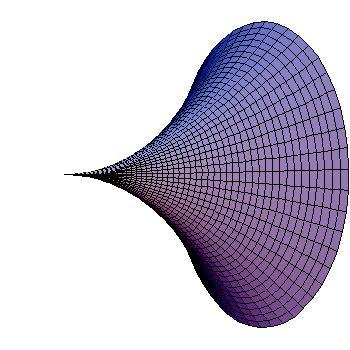A calculus problem by Kunal Gupta
 Consider the curve
y
=
e
−
x
in the first quadrant. Now it's rotated about the
x
-axis
to obtain a solid of revolution. What is its surface area to 4 decimal places?
Consider the curve
y
=
e
−
x
in the first quadrant. Now it's rotated about the
x
-axis
to obtain a solid of revolution. What is its surface area to 4 decimal places?
The answer is 7.2118.
This section requires Javascript.
You are seeing this because something didn't load right. We suggest you, (a) try
refreshing the page, (b) enabling javascript if it is disabled on your browser and,
finally, (c)
loading the
non-javascript version of this page
. We're sorry about the hassle.
1 solution
Can you explain how you arrived at the definite integral?
According to Wolfram, the value is 7.2118
Log in to reply
Oh! Silly me! I was simultaneously solving another question and intermixed the answer @Calvin Lin The Correct Answer is: π 2 + π lo g [ 1 + 2 ] I've changed the problem accordingly.Thanks for pointing out the mistake
Log in to reply
Thanks. I've reversed the edit and updated the answer to 7.2118
Log in to reply
@Calvin Lin – i took a circular strip at 'x' distance of 'dx' width and is area is[ 2(pi)xdx] and integrated it . Whats wrong in that? please explain
Log in to reply
@Akshay Sharma – Are you trying to find the surface area, or the volume?
Log in to reply
@Calvin Lin – ohh!!! I realized my mistake ,Thanks for replying. By the way can I calculate volume using this incorrect method which I tried for calculating surface area
Log in to reply
@Akshay Sharma – Yes. Assuming that the integral converges, we can calculate the Volume of Revolution using the Disc Method
Log in to reply
@Calvin Lin – thanks ,actually i was little confused
Using the Formula for Surface Area: \[\begin{array}{} \text{ Area } & =\displaystyle \int _{ a }^{ b }{ 2\pi f(x)\sqrt { 1+{ (f'(x)) }^{ 2 } } \text{dx }} \\ & = \displaystyle \int _{ 0 }^{ \infty }{ 2\pi { e }^{ -x }\sqrt { 1+{ e }^{ -2x } } \text{dx} } \\ & =\pi \sqrt { 2 } +\pi \log \left[ 1+\sqrt { 2 } \right] \\ & \approx 7.2118 .\square \end{array} \]